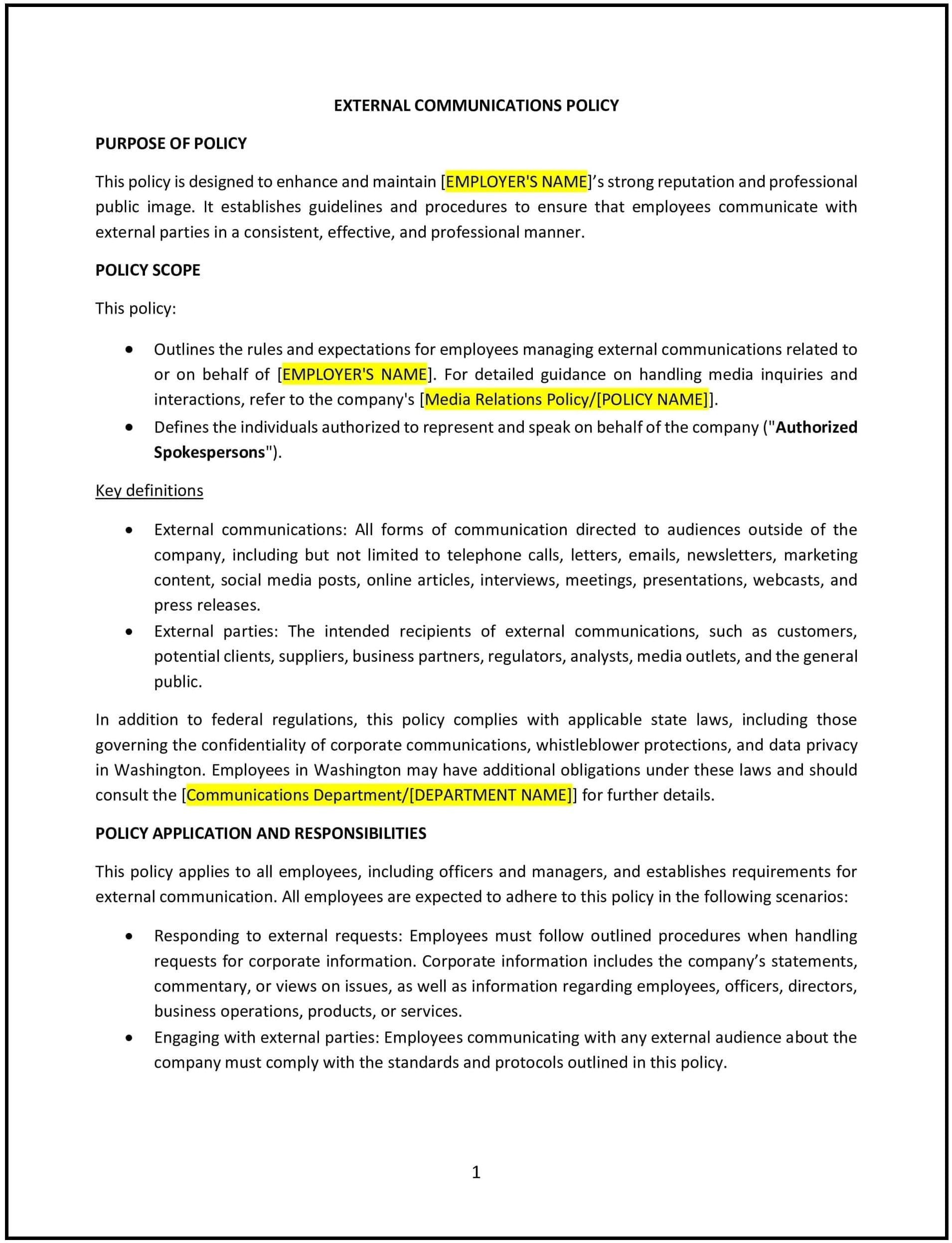External communications policy (Washington): Free template
Got contracts to review? While you're here for policies, let Cobrief make contract review effortless—start your free review now.

Customize this template for free
This external communications policy is designed to help Washington businesses manage how they communicate with external stakeholders, including customers, the media, investors, and the general public. The policy outlines the company's expectations for employees regarding the use of official company communication channels, including email, social media, press releases, and public statements. It aims to ensure that external communications are consistent, accurate, and align with the company’s goals and values.
By adopting this policy, businesses can maintain a professional reputation, minimize risks associated with miscommunication, and ensure that all external communications reflect the company’s brand and message effectively.
How to use this external communications policy (Washington)
- Define the scope of external communications: Clearly specify what constitutes external communications, including press releases, social media posts, email correspondence, public speeches, interviews, and other forms of communication with the public. The policy should outline which types of communications require approval before being issued.
- Identify authorized spokespersons: The policy should designate specific individuals or teams who are authorized to speak on behalf of the company. This may include executives, communications teams, or public relations specialists. The policy should ensure that only trained and authorized personnel handle external communications.
- Set guidelines for public statements: Outline the procedures for making public statements about the company, including guidelines on the tone, language, and content of these statements. Employees should be encouraged to direct all inquiries to authorized spokespersons and avoid speaking publicly without prior approval.
- Address social media use: The policy should include guidelines on the appropriate use of social media by employees in relation to the company. It should specify the dos and don’ts for employees using personal or professional social media accounts to discuss company-related matters. This includes guidelines on confidentiality, brand consistency, and appropriate behavior.
- Promote brand consistency: The policy should ensure that all external communications reflect the company’s brand values, messaging, and voice. This includes maintaining a consistent tone, style, and key messaging across all communication channels to present a unified company image.
- Protect sensitive and confidential information: The policy should stress the importance of protecting sensitive, proprietary, or confidential information when communicating externally. Employees should be trained to avoid disclosing private company details that could lead to competitive disadvantage or legal issues.
- Establish crisis communication procedures: In the event of a crisis or emergency, the policy should outline a procedure for handling communications with external parties. This includes a clear chain of command, predefined messaging, and rapid response protocols to manage public relations effectively during sensitive situations.
- Promote compliance with Washington and federal laws: Ensure the policy complies with Washington state laws, federal regulations, and any industry-specific requirements for external communications, including advertising, marketing, and media relations.
- Review and update regularly: Periodically review and update the policy to ensure it remains compliant with any changes in Washington state laws, federal regulations, or the company’s operations. Regular updates will help keep the policy relevant and effective.
Benefits of using this external communications policy (Washington)
This policy offers several benefits for Washington businesses:
- Maintains brand integrity: By establishing clear guidelines for external communications, the company ensures that its messaging remains consistent, aligned with its values, and professionally presented at all times.
- Reduces legal risks: The policy helps prevent employees from inadvertently disclosing sensitive information or making public statements that could lead to legal or reputational risks.
- Increases public trust: Clear and consistent communication with the public builds trust and credibility, as stakeholders are more likely to engage with a company that communicates transparently and responsibly.
- Enhances crisis management: With predefined protocols for handling public statements during a crisis, businesses can respond quickly and effectively to negative events, minimizing damage to their reputation.
- Improves employee alignment: Employees are more likely to feel aligned with the company’s goals and values when they understand the rules for public communication. This promotes a unified approach to external messaging and strengthens company culture.
- Supports legal compliance: The policy helps businesses comply with state and federal laws related to advertising, marketing, media relations, and other aspects of external communications, ensuring that communications are ethical and legal.
Tips for using this external communications policy (Washington)
- Communicate the policy clearly: Ensure all employees understand the guidelines for external communications and know who is authorized to speak on behalf of the company. Include the policy in the employee handbook, review it during onboarding, and provide regular reminders as needed.
- Train employees: Provide training on how to manage external communications, especially regarding social media, public speaking, and media interviews. This ensures that employees are aware of the company’s expectations and the consequences of failing to follow the policy.
- Monitor communications regularly: Regularly monitor external communications, including social media, to ensure that employees are adhering to the policy. This can help address potential issues early and ensure that the company’s reputation is protected.
- Provide crisis communication training: Ensure that employees, especially senior leadership and the communications team, are trained in crisis communication and understand how to respond appropriately in sensitive situations.
- Review and update regularly: Periodically review the policy to ensure it remains compliant with Washington state laws, federal regulations, and any changes in the company’s operations. Regular updates will help ensure the policy stays relevant and effective.